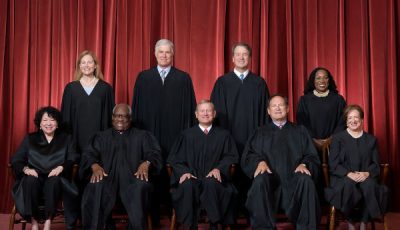Strip Clubs Are Using Her Image – and Carmen Electra Isn’t Having It
 DENVER – Last week, I wrote about model Gigi Hadid getting in hot water over posting images of herself to Instagram to which she didn’t own the rights. Today’s litigation-tale is, in a sense, a reversal of Hadid’s situation.
DENVER – Last week, I wrote about model Gigi Hadid getting in hot water over posting images of herself to Instagram to which she didn’t own the rights. Today’s litigation-tale is, in a sense, a reversal of Hadid’s situation.
In several recent legal actions, model and recording artist Carmen Electra (along with co-plaintiffs) has targeted strip clubs for making unauthorized use of her image. Unlike the lawsuits in which Hadid has been named, Electra’s claims fall not under copyright law, but under the Lanham Act (also known as the Trademark Act of 1946) as well as certain state law claims.
In one such case, Toth et al v. 59 Murray Enterprises, Inc. et al, Electra and her co-plaintiffs took aim at a company which operates several strip clubs in New York, including New York Dolls Gentlemen’s Club, Private Eyes Gentlemen’s Club and Flashdancer’s Gentlemen’s Club.
It was undisputed by the defendants in Toth that images which depicted Electra and the other plaintiffs on their clubs’ websites and social media accounts. In the court’s view, this alone isn’t enough to make the clubs liable, however.
“Whether these misrepresentations are likely to cause consumer confusion actionable under the Lanham Act, however, is a separate question and the subject of the next step in our analysis,” U.S. District Court Judge Naomi Rice Buchwald wrote in an order issued early last month.
Much of the court’s decision came down to the “strength” of the marks at issue in the case – the marks, in this context, being the models themselves. Were they sufficiently recognizable for use of their images to cause confusion and lead consumers to believe they were either endorsing or appearing at the clubs?
The only plaintiff to meet the court’s standard on that front was Electra, who “offered persuasive evidence of the strength of her mark.”
“Electra’s uncontroverted resume establishes that she has not just appeared in popular movies and television shows, but had regular and starring roles in them,” Buchwald wrote in her decision. “She is a recording artist that has released a self-titled album under a well-known record label. Brands and businesses have placed value in her appearances to the tune of millions of dollars. These achievements are indicia of a strong mark. Moreover, counsel for defendants concede that Electra may be well known enough to be recognized in an advertisement containing only her image and without her name.”
As for the other 10 plaintiffs in the case… well, not so much.
“In contrast, the remaining ten plaintiffs have failed to adduce evidence of a strong mark,” the judge wrote. “Unlike plaintiff Electra, none of these other plaintiffs offered evidence of significant income earned through their various appearances. And while these other plaintiffs have participated in promotional campaigns for a wide variety of brands and appeared in magazines, TV shows, and movies, their resumes are devoid of evidence that they actually garnered recognition for any of their appearances. Simply listing brands or magazine titles is insufficient.”
That the New York court found in favor of Electra may not bode well for Shotgun Willie’s, the club targeted in a complaint filed by Electra and other plaintiffs in Colorado last week.
“To promote Shotgun Willie’s, and in furtherance of Defendant’s commercial benefit, Defendant altered, posted, and then continually maintained on its Facebook, Instagram, and Twitter account, images of the Plaintiffs,” the plaintiffs contend in Pinder et al v. Bavaria Inn Restaurant, Inc. (Bavaria Inn does business as Shotgun Willie’s, and model/actress Lucy Pinder is one of Electra’s co-plaintiffs.)
Just as the defendants were accused of doing in Toth, Shotgun Willie’s allegedly “altered, posted, and then continually maintained on its Facebook, Instagram, and Twitter account, images of the Plaintiffs.”
“Defendant knew that its use of Plaintiffs’ images and likenesses was unauthorized, and knew that its use of Plaintiffs’ images would cause consumer confusion as to Plaintiffs’ sponsorship, approval of, affiliation with, and/or employment at Shotgun Willie’s,” the plaintiffs contend in their complaint. “Defendant’s unauthorized use of the Plaintiffs’ images, likenesses and/or identities, as described herein, violates Section 43 of the Lanham Act.”
These cases are just two of many similar actions in which Electra appears as a co-plaintiff. She’s also a part of similar lawsuits filed in Florida (Cerny et al v. The Boulevard Del, Inc.), Illinois (Moreland et al v. Club 390 Corp.) and Ohio (Electra et al v. F.M.J. Restaurant, Inc. et al and several other cases). There may be others, as well.
What’s not clear is how much Electra stands to benefit from the lawsuits from a financial perspective. While damages are sought in every case, if the Toth decision is any indication, those damages might not add up to a particularly significant sum.
While the court granted Electra the injunctive relief she sought in the case (“The Court permanently enjoins defendants from using Electra’s image in any of their promotional content without Electra’s permission”) it also denied her summary judgment on Lanham Act damages and attorney’s fees.
“Plaintiffs failed to proffer evidence of either bad faith or actual consumer confusion,” Buchwald wrote in her order. “We therefore deny plaintiffs’ motion for summary judgment for Lanham Act damages and grant defendants’ cross-motion. Plaintiffs motion for an award attorney fees… fails for the same reason.”
Still, even if they don’t have to eat Electra’s attorney’s fees in the case, the defendants likely still have a significant legal bill coming to them. “Here, where both parties’ motions were granted in part and denied in part, both sides should bear their own costs,” Buchwald wrote.
Carmen Electra image by Glenn Francis, www.PacificProDigital.com licensed under Creative Commons Share Alike













